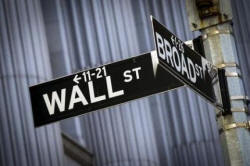|
 Investors
cut U.S. equity exposure to lowest since January '08:
survey Investors
cut U.S. equity exposure to lowest since January '08:
survey
 Send a link to a friend
Send a link to a friend
[May 19, 2015]
By Jamie McGeever
LONDON (Reuters) - International investors
slashed their exposure to U.S. equities in May to its lowest in over
seven years, while maintaining the euro zone as their leading stock
market destination, a closely watched survey said on Tuesday.
|
|
 Driven by worries about a string of disappointing U.S. economic
indicators and the strength of the dollar, global investors cut
their allocation to U.S. stocks to 19 percent underweight from 12
percent underweight the month before. Driven by worries about a string of disappointing U.S. economic
indicators and the strength of the dollar, global investors cut
their allocation to U.S. stocks to 19 percent underweight from 12
percent underweight the month before.
That's according to the monthly Bank of America Merrill Lynch survey
of 169 fund managers who run $479 billion of funds, which was
conducted May 8-15, and comes just as the S&P 500 <.SPX> hits record
highs.
"Relative positioning of the U.S. vs the rest of the world is now at
the most extreme since November 2007," BAML said in its report.
"Contrarians would go long U.S. equities relative to the broader
market."
While 70 percent of respondents expect global growth to strengthen
and the rise in oil has pushed inflation expectations to a 10-month
high, expectations for the first U.S. interest rate increase have
been pushed back.

More than half of those polled now expect the first Federal Reserve
rate hike since June 2006 to come in the fourth quarter of this year
or later.
Meanwhile, a net 49 percent of those surveyed were overweight euro
zone stocks in May, up from 45 percent in April. Only one in 10
managers polled was underweight euro zone stocks.
"Positioning in euro zone equities remains crowded," BAML said in
its report.
Overall, investors reduced their global equity allocation to a net
47 percent overweight, the lowest in six months. Global bond
allocations were cut to a net 60 percent underweight, the lowest in
nine months, as the global bond rout of April and May took hold.
[to top of second column] |

While both equities and bonds may be richly valued, investors think
the biggest risk of volatility this year is in bonds. Only 5 percent
of those surveyed said they expected bond yields to fall this year.
With crude surging some 50 percent from a January low, only a net 13
percent of investors thought oil was undervalued, the lowest
percentage in eight months.
Demand for safe-haven cash slipped to a still "elevated" 4.5 percent
in May from 4.6 percent in April. Cash levels above 4.5 percent are
a contrarian "buy" signal for equities, and below 3.5 percent
triggers a "sell" signal, BAML said.
(Reporting by Jamie McGeever; Editing by Larry King)
[© 2015 Thomson Reuters. All rights
reserved.] Copyright 2015 Reuters. All rights reserved. This material may not be published,
broadcast, rewritten or redistributed.
 |